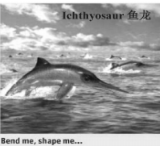题目内容
9.Do you find yourself leading groups,or are you naturally more comfortable following others?Research published today shows that if you want to be a leader you're better off at the edges of a crowd,and not in the middle of the action.In a series of experiments on crowd behaviour,a research team at the University of Leeds also found that successful leaders display more decisive behaviour,spending less time following others and acting more quickly than others in the group.
Lead researcher Jolyon Faria said:"It was interesting to find that the most effective leaders remained on the edges of the group and attempted to lead from the front.You'd think leaders in the centre of the group should interact more often with others and therefore be more effective but here this wasn't the case."
The research team asked groups of eight students to walk around continuously in a specified area and remain as a group without speaking or gesturing to one another.
One person was asked to move towards a target,while remaining a member of the group,without letting the others know that he or she was leading them to a target.In a second set of experiments,the students were told to follow"the leader",but not told who the leader was.
In the second set of experiments,it was found that those leaders who remained on the edge of the group were able to move their group towards a target much more quickly than the leaders that chose to remain in the centre.
"We wanted to find out how people decided who to follow"said Faria."We found that people were able to identify their leader by what position the leader takes,which helps explain how animals in groups-such as birds and fish-can be led by only a small minority,even when leaders don't signal their identity."
"Our findings have illustrated a general principle behind group behaviour.This can also be applied to animal groups,something that could help in the management of the natural environment,as well as in the management of the urban environment."
(Note:Answer the questions and complete the statements in NO MORE THAN TWELVE WORDS.)
78.The decisive behavior successful leaders display in a group is that theyspend less time following others and act more quickly.
79.According to Jolyon Faria,people tend to have the wrong belief that leaders shouldstay in the center of the group and interact more with others in order to be more effective.
80.We can learn from the passage that the fish leaders may lead the whole group byremaining on the edges of the group.
81.What does"a general principle"refer to in the last paragraph?People can identify their leader by the position he takes.
分析 最近的一项研究表明,人们一般会认为领导人是领导集团的中心,应该更多的与他人互动才会更有效,但事实并不是这样,当领导人处于集体的边缘地位时,整个集体活动才会更有效.这项原则也可以用来判断领导人而应用在环境保护中.
解答 78.spend less time following others and act more quickly.由第二段中 successful leaders display more decisive behaviour,spending less time following others and acting more quickly than others in the group,可知成功的领导者有着更果断的行为,很少跟随他人,却,比其他人更快地行动,故填spend less time following others and act more quickly.
79.stay in the center of the group and interact more with others.由第三段中You'd think leaders in the centre of the group should interact more often with others and therefore be more effective but here this wasn't the case.你会认为领导人是领导集团的中心,应该更多的与他人互动才会更有效,但事实并不是这样.即这种想法是人们错误的观点.故填stay in the center of the group and interact more with others.
80.remaining on the edges of the group.由倒数第三段those leaders who remained on the edge of the group were able to move their group towards a target much more quickly than the leaders that chose to remain in the centre,领导人保持边缘的集团能够比领导人留在中心的集团行动更迅速,以及下一段中which helps explain how animals in groups-such as birds and fish-can be led by only a small minority,这有助于解释在动物集团中,鸟类和鱼可以只由少数领导人领导.共同推出,鱼的领导人处在集团边缘.故填remaining on the edges of the group.
81.People can identify their leader by the position he takes.由最后一段可知,这项研究结果说明了集团背后的一般规则,既适用于人,又适用于动物.而全文讲述的是领导人所处位置的不同.因此这个原则就是,由领导人所处的位置就可以判断他的地位.故填People can identify their leader by the position he takes.
点评 本篇完型紧扣文章内容,考生需要找到对应的原文并且加以时态或动词的变化.其中81题是难点,需要总结全文并结合文中细节来作答.

 阅读快车系列答案
阅读快车系列答案| A. | had walked | B. | has been walking | ||
| C. | walked | D. | is walking |
-Yes,but I don't think ______ could pass it.( )
| A. | somebody | B. | anybody | C. | everybody | D. | nobody |
-I think so.He _________ in the library every night over the last two months.( )
| A. | studies | B. | studied | ||
| C. | is studying | D. | has been studying |
 We've considered several ways of paying to cut inline:hiring line standers,buying tickets from scalpers (票贩子),or purchasing line cutting privileges directly from,say,an airline or an amusement park.Each of these deals replaces the morals of the queue (waiting your turn) with the morals of the market (paying a price for faster service).
We've considered several ways of paying to cut inline:hiring line standers,buying tickets from scalpers (票贩子),or purchasing line cutting privileges directly from,say,an airline or an amusement park.Each of these deals replaces the morals of the queue (waiting your turn) with the morals of the market (paying a price for faster service).